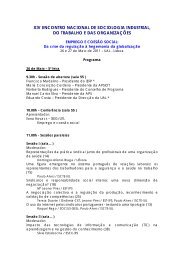Web-based Learning Solutions for Communities of Practice
Web-based Learning Solutions for Communities of Practice
Web-based Learning Solutions for Communities of Practice
Create successful ePaper yourself
Turn your PDF publications into a flip-book with our unique Google optimized e-Paper software.
228<br />
A Proposed Framework <strong>for</strong> Designing Sustainable <strong>Communities</strong> <strong>for</strong> Knowledge Management Systems<br />
Pan, S. L., & Leidner, D. E. (2003). Bridging communities<br />
<strong>of</strong> practice with in<strong>for</strong>mation technology<br />
in the pursuit <strong>of</strong> global knowledge sharing. Journal<br />
<strong>of</strong> Strategic In<strong>for</strong>mation Systems, 12, 71-88.<br />
Polanyi, M. (1958). Personal knowledge, towards<br />
a post-critical philosophy. Chicago, IL: University<br />
<strong>of</strong> Chicago Press.<br />
Porra, J., & Goel, L. (2006, November 18-21).<br />
Importance <strong>of</strong> Power in the Implementation<br />
Process <strong>of</strong> a Successful KMS: A Case Study. In<br />
37 th Annual Meeting <strong>of</strong> the Decision Sciences<br />
Institute, San Antonio, TX..<br />
Porra, J., & Parks, M.S. (2006). Sustaining virtual<br />
communities: Suggestions from the colonial<br />
model. In<strong>for</strong>mation Systems and e-Business<br />
Management, 4(4), 309-341.<br />
Postmes, T., Spears, R., & Lea, M. (2000). The<br />
<strong>for</strong>mation <strong>of</strong> group norms in computer-mediated<br />
communication. Human Communication Research,<br />
26(3), 341-371.<br />
Prandelli, E., Verona, G. & Raccagni, D. (2006).<br />
Diffusion <strong>of</strong> web-<strong>based</strong> product innovation. Cali<strong>for</strong>nia<br />
Management Review, 48(4), 109-135.<br />
Preece, J., Nonnecke, B., & Andrews, D. (2003).<br />
The top five reasons <strong>for</strong> lurking: improving community<br />
experiences <strong>for</strong> everyone. Computers in<br />
Human Behavior In Press.<br />
Prusak, L. (2001). Where did knowledge management<br />
come from? IBM Systems Journal, 40(4),<br />
1002-1007.<br />
Rogers, E. M., & Agarwala-Rogers, R. (1975). Organizational<br />
communication. G. L. Hanneman, &<br />
W. J. McEwen, (Eds.), Communication behaviour<br />
(pp. 218–236). Reading, MA: Addision Wesley.<br />
Ryle, G. (1949/1984). The concept <strong>of</strong> mind. Chicago,<br />
IL: University <strong>of</strong> Chicago Press.<br />
Sherif, K., & Xing, B. (2006). Adaptive processes<br />
<strong>for</strong> knowledge creation in complex systems: the<br />
case <strong>of</strong> a global IT consulting firm, In<strong>for</strong>mation<br />
and Management, 43(4), 530 - 540<br />
Silva, L., Mousavidin, E., & Goel, L. (2006). <strong>Web</strong>logging:<br />
Implementing <strong>Communities</strong> <strong>of</strong> <strong>Practice</strong>.<br />
In Social Inclusion: Societal and Organizational<br />
Implications <strong>for</strong> In<strong>for</strong>mation Systems: IFIP TC8<br />
WG 8.2, Limirick, Ireland.<br />
Schultze, U., & Leidner, D. (2002). Studying<br />
knowledge management in in<strong>for</strong>mation systems<br />
research: Discourses and theoretical assumptions.<br />
MISQ, 26(3), 213-242.<br />
Schultze, U., & Stabell, C. (2004). Knowing what<br />
you don’t know? Discourses and contradictions<br />
in knowledge management research. Journal <strong>of</strong><br />
Management Studies, 41(4), 549–573.<br />
Shin, M. (2004). A framework <strong>for</strong> evaluating<br />
economics <strong>of</strong> knowledge management systems.<br />
In<strong>for</strong>mation & Management, 42, 179-196.<br />
Stein, E. W (2006). A qualitative study <strong>of</strong> the<br />
characteristics <strong>of</strong> a community <strong>of</strong> practice <strong>for</strong><br />
knowledge management and its success factors<br />
International Journal <strong>of</strong> Knowledge Management,<br />
1(4), 1-24<br />
Tajfel, H., & Turner, J. C. (1986). The social identity<br />
theory <strong>of</strong> intergroup behavior. In S.Worchel<br />
& W. G.Austin (Eds.), Psychology <strong>of</strong> intergroup<br />
relations (pp. 7–24). Chicago: Nelson-Hall.<br />
Usoro, A., & Ku<strong>of</strong>ie, M. H. S (2006). Conceptualisation<br />
<strong>of</strong> cultural dimensions as a major influence<br />
on knowledge sharing. International Journal <strong>of</strong><br />
Knowledge Management, 2(2), 16-25.<br />
Wasko, M. M., &Faraj, S. (2000). ‘It is what one<br />
does:’ Why people participate and help others in<br />
electronic communities <strong>of</strong> practice. JSIS, 9(2/3),<br />
155-173.<br />
Wasko, M. M., & Faraj, S. (2005). Why should I<br />
share? Examining knowledge contribution in networks<br />
<strong>of</strong> practice. MIS Quarterly, 29(1), 35-57.



